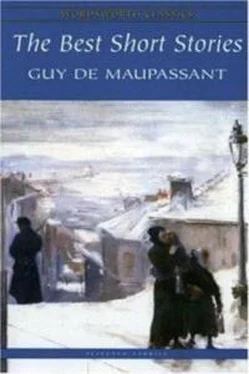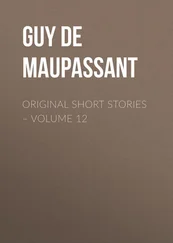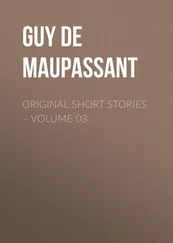"Decidedly, the air of Paris does not resemble any other air. It has in it something indescribably stimulating, exciting, intoxicating, which fills you with a strange longing to dance about and to do many other things. As soon as I arrive here, it seems to me, all of a sudden, that I have taken a bottle of champagne. What a life one can lead in this city in the midst of artists! Happy are the elect, the great men who make themselves a reputation in such a city! What an existence is theirs!"
And he made plans; he would have liked to know some of these celebrated men, to talk about them in Vernon, and to spend an evening with them from time to time in Paris.
But suddenly an idea struck him. He had heard allusions to little cafes in the outer boulevards at which well–known painters, men of letters, and even musicians gathered, and he proceeded to go up to Montmartre at a slow pace.
He had two hours before him. He wanted to look about him. He passed in front of taverns frequented by belated bohemians, gazing at the different faces, seeking to discover the artists. Finally, he came to the sign of "The Dead Rat," and, allured by the name, he entered.
Five or six women, with their elbows resting on the marble tables, were talking in low tones about their love affairs, the quarrels of Lucie and Hortense, and the scoundrelism of Octave. They were no longer young, were too fat or too thin, tired out, used up. You could see that they were almost bald; and they drank beer like men.
M. Saval sat down at some distance from them and waited, for the hour for taking absinthe was at hand.
A tall young man soon came in and took a seat beside him. The landlady called him M. "Romantin." The notary quivered. Was this the Romantin who had taken a medal at the last Salon?
The young man made a sign to the waiter.
"You will bring up my dinner at once, and then carry to my new studio, 15 Boulevard de Clichy, thirty bottles of beer, and the ham I ordered this morning. We are going to have a housewarming."
M. Saval immediately ordered dinner. Then, he took off his overcoat, so that his dress suit and his white tie could be seen. His neighbor did not seem to notice him. He had taken up a newspaper, and was reading it. M. Saval glanced sideways at him, burning with the desire to speak to him.
Two young men entered, in red vests and with peaked beards, in the fashion of Henry III. They sat down opposite Romantin.
The first of the pair said:
"Is it for this evening?"
Romantin pressed his hand.
"I believe you, old chap, and everyone will be there. I have Bonnat, Guillemet, Gervex, Beraud, Hebert, Duez, Clairin, and Jean–Paul Laurens. It will be a stunning affair! And women, too! Wait till you see! Every actress without exception—of course I mean, you know, all those who have nothing to do this evening."
The landlord of the establishment came across.
"Do you often have this housewarming?"
The painter replied:
"I believe you, every three months, each quarter."
M. Saval could not restrain himself any longer, and in a hesitating voice said:
"I beg your pardon for intruding on you, monsieur, but I heard your name mentioned, and I would be very glad to know if you really are M. Romantin, whose work in the last Salon I have so much admired?"
The painter answered:
"I am the very person, monsieur."
The notary then paid the artist a very well–turned compliment, showing that he was a man of culture.
The painter, gratified, thanked him politely in reply.
Then they chattered. Romantin returned to the subject of his house–warming, going into details as to the magnificence of the forthcoming entertainment.
M. Saval questioned him as to all the men he was going to receive, adding:
"It would be an extraordinary piece of good fortune for a stranger to meet at one time so many celebrities assembled in the studio of an artist of your rank."
Romantin, vanquished, replied:
"If it would be agreeable to you, come."
M. Saval accepted the invitation with enthusiasm, reflecting:
"I shall have time enough to see Henri VIII."
Both of them had finished their meal. The notary insisted on paying the two bills, wishing to repay his neighbor's civilities. He also paid for the drinks of the young fellows in red velvet; then he left the establishment with the painter.
They stopped in front of a very long, low house, the first story having the appearance of an interminable conservatory. Six studios stood in a row with their fronts facing the boulevards.
Romantin was the first to enter, and, ascending the stairs, he opened a door, and lighted a match and then a candle.
They found themselves in an immense apartment, the furniture of which consisted of three chairs, two easels, and a few sketches standing on the ground along the walls. M. Saval remained standing at the door somewhat astonished.
The painter remarked:
"Here you are! we've got to the spot; but everything has yet to be done."
Then, examining the high, bare apartment, its ceiling disappearing in the darkness, he said:
"We might make a great deal out of this studio."
He walked round it, surveying it with the utmost attention, then went on:
"I know someone who might easily give a helping hand. Women are incomparable for hanging drapery. But I sent her to the country for to–day in order to get her off my hands this evening. It is not that she bores me, but she is too much lacking in the ways of good society. It would be embarrassing to my guests."
He reflected for a few seconds, and then added:
"She is a good girl, but not easy to deal with. If she knew that I was holding a reception, she would tear out my eyes."
M. Saval had not even moved; he did not understand.
The artist came over to him.
"Since I have invited you, you will assist ma about something."
The notary said emphatically:
"Make any use of me you please. I am at your disposal."
Romantin took off his jacket.
"Well, citizen, to work!' We are first going to clean up."
He went to the back of the easel, on which there was a canvas representing a cat, and seized a very worn–out broom.
"I say! Just brush up while I look after the lighting."
M. Saval took the broom, inspected it, and then began to sweep the floor very awkwardly, raising a whirlwind of dust.
Romantin, disgusted, stopped him: "Deuce take it! you don't know how to sweep the floor! Look at me!"
And he began to roll before him a heap of grayish sweepings, as if he had done nothing else all his life. Then, he gave bark the broom to the notary, who imitated him.
In five minutes, such a cloud of dust filled the studio that Rormantin asked:
"Where are you? I can't see you any longer."
M. Saval, who was coughing, came near to him. The painter said:
"How would you set about making a chandelier?"
The other, surprised, asked:
"What chandelier?"
"Why, a chandelier to light the room—a chandelier with wax–candles."
The notary did not understand.
He answered: "I don't know."
The painter began to jump about, cracking his fingers.
"Well, monseigneur, I have found out a way."
Then he went on more calmly:
"Have you got five francs about you?"
M. Saval replied:
"Why, yes."
The artist said: "Well! you'll go out and buy for me five francs' worth of wax–candles while I go and see the cooper."
And he pushed the notary in his evening coat into the street. At the end of five minutes, they had returned, one of them with the wax–candles and the other with the hoop of a cask. Then Romantin plunged his hand into a cupboard, and drew forth twenty empty bottles, which he fixed in the form of a crown around the hoop.
He then went downstairs to borrow a ladder from the janitress, after having explained that he had made interest with the old woman by painting the portrait of her cat, exhibited on the easel.
Читать дальше












